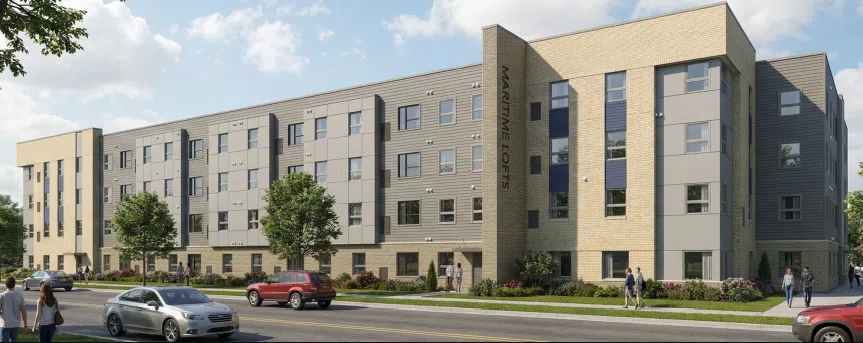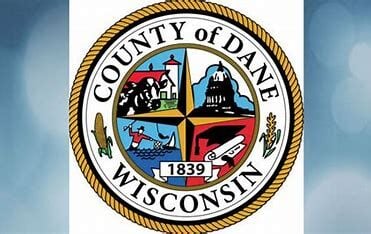
Wisconsin Workforce Housing News

This Weeks Articles for 2/16/2026 ...
- Manitowoc Community Development Authority Approves Mirro Apartment Site Plans...
- Why is Kenosha one of America’s hottest housing markets? ...
- Neenah pursuing 50-unit development; would include workforce housing, commercial space...
- Fitchburg to receive funds for affordable housing ...
- WHEDA advances several local projects for affordable housing tax credits ...
- Madison expands affordable homeownership with ‘missing middle’ housing...
Community Updates, News Stories, Best Practices, Resources, and other data supporting the development of affordable housing for the citizens of Wisconsin in every city and region in the State. Please consider partnering with us and sharing your story

Manitowoc Community Development Authority Approves Mirro Apartment Site Plans
 The City of Manitowoc is getting ready for building on the former Mirro Property.
The City of Manitowoc is getting ready for building on the former Mirro Property.Community Development Director Adam Tegan told the Community Development Authority (CDA) that the new Maritime Lofts would have 59 apartments, including 21 one-bedroom apartments, 20 two-bedroom apartments, and 18 three-bedroom apartments.
On-site amenities would also include a community room, a fitness center, an onsite leasing office, and on-site residential storage.
Tegan said that this would also be a workforce housing project.
“It has obtained low-income tax credits through the state already,” he explained. “And they are working on assembling all their other pieces of the capital stack, which I believe includes some money from the Department of Administration, potentially federal home funds.”...
...Full Story Here
Leo`s notes: Manitowoc’s Maritime Lofts project is another example of how former industrial land can become the foundation for workforce housing. This broader and complex project pairs brownfield redevelopment with layered public financing to create housing for working families. If construction begins later this year as planned, Maritime Lofts will mark a visible step forward in turning underutilized land into long-term community stability.

Why is Kenosha one of America’s hottest housing markets?
 KENOSHA, Wis. — February in Wisconsin is anything but hot, except when you are talking about the housing market.
KENOSHA, Wis. — February in Wisconsin is anything but hot, except when you are talking about the housing market.According to data from Realtor.com, several Wisconsin cities rank among the top 20 hottest housing markets in the country, including Wausau, Appleton, Milwaukee, Janesville and Oshkosh.
Kenosha takes the top spot, ranked as Realtor.com’s Hottest Metro in the United States.
What You Need To Know
- According to data from Realtor.com, several Wisconsin cities rank among the top 20 hottest housing markets in the country
- Kenosha takes the top spot, ranked as Realtor.com’s Hottest Metro in the United States
- The list is filled with midwestern cities, where demand for housing remains high, but the overall number of new builds is low compared to other regions of the country
- In Kenosha County, population growth is stagnant (hovering around 170,000 residents since 2010)
The hotness metric looks at market demand as well as how quickly homes sell. The list is filled with Midwestern cities where demand for housing remains high, but the overall number of new builds is low compared to other regions of the country... ...Full Story Here
Leo`s notes: The message is clear: demand is strong, but supply isn’t keeping up. Without accelerating housing production across price points—especially workforce and attainable homes—Wisconsin risks constraining the very growth these “hot” rankings reflect.

Neenah pursuing 50-unit development; would include workforce housing, commercial space

NEENAH (WLUK) -- Neenah is pursuing a 50-unit workforce housing development, located at 1311 S. Commercial Street and spanning two acres.
It would also include 2,100 square feet of commercial space.
A plan is in place with the Madison-based Eminent Development Corporation, but the deal isn`t done yet. It hinges on the development company`s ability to get state tax credits, which will be awarded in May.
Details on the proposal:
- Plan calls for 32 apartment units, 16 stacked flats and four townhomes
- Construction would begin in spring 2027 with completion in summer 2028, if all goes to plan
- $18 million project, all privately financed with the help of state tax credits
- Part of Neenah`s South Commercial Street plan...
Leo`s notes: As communities across Wisconsin compete for state tax credits to make these projects viable, Neenah’s approach underscores an important lesson: strategic public land use, corridor planning, and workforce-focused housing are critical tools for sustaining economic growth and keeping local workers rooted in the communities they serve. Looking forward to tracking this multi-faceted development!

Wisconsin Workforce Housing Resources
 ...Full Story Here
...Full Story Here
Fitchburg to receive funds for affordable housing

New county program focuses on rehabilitation, preservation
Dane County will award $3,926,399 in funding through a unique new program focused on preserving existing units of affordable housing across Dane County, Dane County Executive Melissa Agard announced in a news release.
It’s the fund’s first-ever round of awards, anticipated to preserve and/or rehabilitate 65 units of housing in the communities of Fitchburg, Stoughton, and Madison, and create four new units of affordable housing in the Village of Waunakee.
“Preserving the affordable housing we already have is one of the smartest and most cost-effective ways to address our housing crisis,” said Dane County Executive Melissa Agard. “These investments will keep dozens of families and individuals stably housed, protect long-term affordability in communities across Dane County, and ensure that existing homes remain safe, livable, and within reach for people at a range of incomes. This first round of awards reflects our commitment to using every tool available to meet urgent housing needs while building a stronger, more equitable county.”...
...Full Story HereLeo`s notes: Dane County’s first round of Preservation Fund awards marks an important shift in housing strategy: protecting the affordable homes currently there. By investing nearly $4 million to rehabilitate 65 existing units and add new ones in Fitchburg, Stoughton, Madison and Waunakee, the county is recognizing that preservation is often faster and more cost-effective than new construction. In a tight housing market, safeguarding existing units is not just prudent policy, but also essential to maintaining long-term community stability and housing choices.

WHEDA advances several local projects for affordable housing tax credits
 Seventeen apartment projects in southeast Wisconsin totaling 1,205 affordable apartment units are one step closer to receiving crucial affordable housing tax credits after receiving preliminary approvals. The Wisconsin Housing and Economic Development Authority (WHEDA) granted preliminary conceptual approval to 53 housing projects statewide, which allows developers to pursue federal and state affordable housing tax credits that... ...Full Story Here
Seventeen apartment projects in southeast Wisconsin totaling 1,205 affordable apartment units are one step closer to receiving crucial affordable housing tax credits after receiving preliminary approvals. The Wisconsin Housing and Economic Development Authority (WHEDA) granted preliminary conceptual approval to 53 housing projects statewide, which allows developers to pursue federal and state affordable housing tax credits that... ...Full Story HereLeo`s notes: Across our state, developers that pursue and receive federal and state tax credits often make the difference between a project moving forward or stalling. Although not the only solution, WHEDA’s pipeline signals both the scale of need and the importance of tax credit equity as the primary engine driving affordable housing production across the region.

Madison expands affordable homeownership with ‘missing middle’ housing

The City of Madison celebrates two new affordable homes in the Owl Creek neighborhood, aimed at expanding affordable housing options for first-time homeowners.
Madison officials and community members celebrated the construction of two “missing middle” affordable twin homes in the Owl Creek neighborhood on Jan. 21.
“MACLT is incredibly excited to be such a big part of the City of Madison`s Housing Forward initiative,” Madison Area Community Land Trust Housing Director Deaken Boggs told The Daily Cardinal. “MACLT`s form of permanently affordable homeownership has been deployed throughout the city as we have added nine new homes to our program since 2021 bringing our total permanently affordable homes to 69 across the City of Madison.”
The project highlights the City of Madison’s ongoing efforts through Madison’s Comprehensive Plan to expand affordable housing options through the promotion of “missing middle” housing — properties the city’s Northeast Area Plan describes as “a range of housing types scaled between single-family detached houses and larger apartment buildings.”...
...Full Story Here
Leo`s notes: Madison’s celebration of two new permanently affordable twin homes in Owl Creek underscores the growing role of “missing middle” housing in closing the ownership gap. By combining modest-scale duplex design with a 99-year ground lease that caps resale appreciation, Madison is preserving affordability for future generations while allowing first-time buyers to build equity. At a time when homeownership feels increasingly out of reach for working families, this model demonstrates how land policy, zoning reform and targeted subsidy can work together to create lasting, community-centered housing solutions.

About Wisconsin Workforce Housing News (WWHNews.com)
 Across Wisconsin many employees can simply not afford to live where they work.
Across Wisconsin many employees can simply not afford to live where they work. This is true in big cities and small rural communities. Both the availability and price of housing is not in line with the needs of those working in jobs that are vital to the success of our communities. Imagine a firefighter, teacher, city employee, service, or retail worker not able to afford a home in the community they serve.

List of Housing Resources

WRA Wisconsin Housing Statistics (Thanks Jon!)
State of Wisconsin Department of Administration Neighborhood Investment Fund (NIF) Program
ENABLING BETTER PLACES: A USER’S GUIDE TO WISCONSIN NEIGHBORHOOD AFFORDABILITY
WHEDA’s Rural Affordable Workforce Housing Initiative
Wisconsin REALTORS® Association
WISCAP Affordable Housing Network
Division of Energy, Housing and Community Resources
Housing Authority City of Milwaukee (HACM)
Wisconsin Housing Preservation Corp
WEDA Legislative Tracker
NRA Housing Needs By State / Wisconsin
DANE WORKFORCE HOUSING FUND
Dane County Regional Housing Strategy (RHS)
A Housing Hurdle: Demographics Drive Need for More Homes
Wisconsin Homeowners Alliance
WRA’s “Falling Behind” report
Social Development Commission - Pathway to success
COMMUNITY DEVELOPMENT ALLIANCE
Middleton Workforce Housing Committe
Milwaukee’s Collective Affordable Housing Strategic Plan
Workforce Housing Initiative For Wisconsin
2020 Symposia Series on Workforce Housing
Wisconsin Homeowners Alliance.org/resources/
City of Milwaukee Affordability Report
WHEDA Qualified Allocation Plan
10-Year Plan to End Homelessness
City of Milwaukee Consolidated Plan
Wisconsin Consolidated Plan
SEWRPC Regional Housing Plan
Wisconsin Policy Forum Reports
Blueprint for a Renters Bill of Rights
White House Fact Sheet on Rental Affordability
Community Economic Development / Division of Extension
Oshkosh Kids Foundation Tiny House Village



 Wisconsin REALTORS® Association
Wisconsin REALTORS® Association






